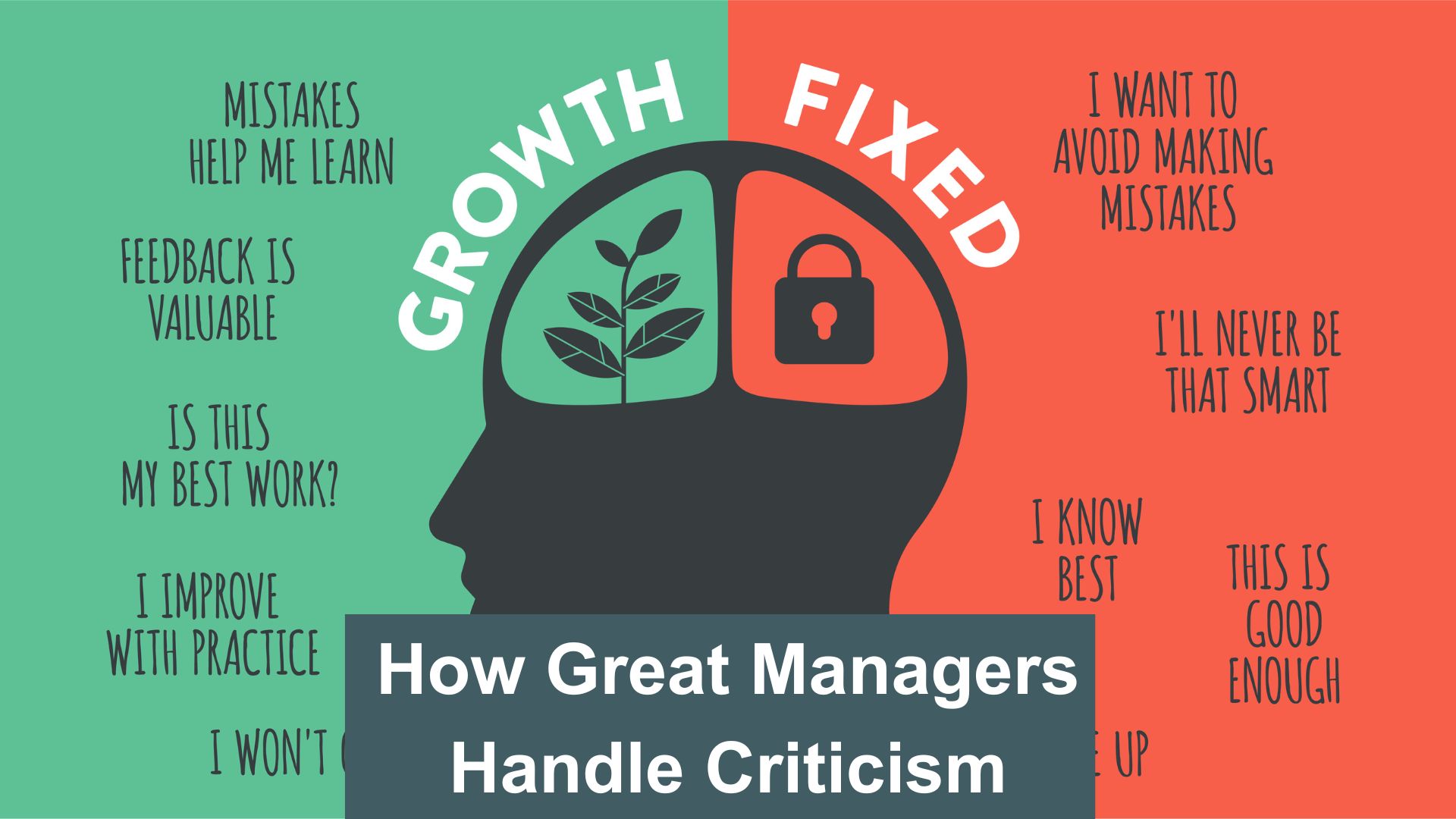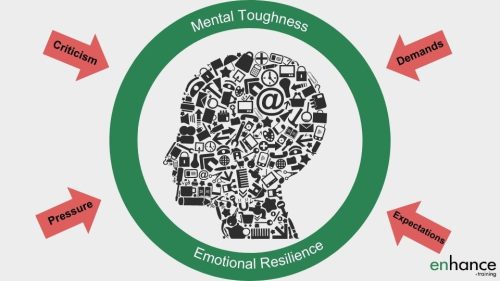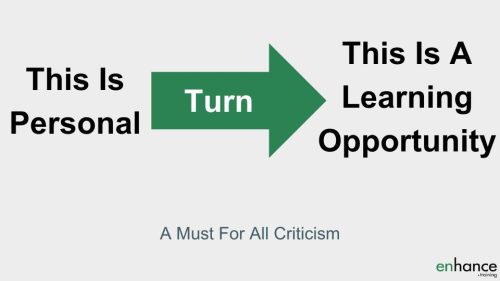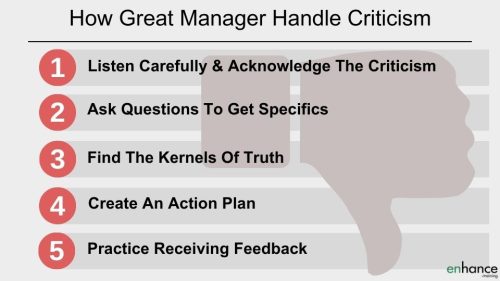How Great Managers Handle Criticism – 5 Key Actions to Take

Observing how great managers handle criticism provides amazing lessons. Learning from criticism is an incredibly important step for everyone. As you progress your career and certainly as you progress through the management ranks, you are asked to handle more and more criticism in a positive way.
It can be infuriating to get criticism after you have put your heart and soul into planning a project, building a team or any number of other activities and tasks. You cannot please everyone, nor should you try to. Learn 5 actions to turn even the harshest of criticism into useful digestible feedback that won’t destroy your confidence.
5 actions for how to handle criticism
- Listen carefully and acknowledge the criticism
- Ask questions to get specifics
- Find the kernels of truth
- Create an action plan
- Practice receiving feedback
How great managers handle criticism comes down to looking for the learning points and creating actions, whether the criticism is justified or not, whether it is fair or not. Worry about what you can learn for each situation rather than if the criticism is fair.
Being in positions of responsibility exposes you to more criticism. It is an unavoidable part of the job. Leaders and managers need to build emotional resilience and mental toughness without shutting off their empathy and consideration for others.
I hope what we cover today will help you improve how you are dealing with criticism at work
Watch on YouTube
Listen on Podcast
Listen carefully and acknowledge the criticism – The first action to handle criticism
When being criticised, keeping your emotions under control is the first task. Counter criticising, being defensive, showing anger, annoyance, hurt and any other negative emotion doesn’t help you in handling the criticism in the workplace.
Mentally, turn the – “this is personal” – response into a – “this is a learning opportunity”- and listen to what is being said. Do your best to take in the messages and information without ignoring or challenging it. Then seek to understand what is being told to you.
Don’t interrupt. Use your body language to encourage them to say everything they plan – keep good eye contract, keep your facial features positive and open, use little nods and lean forward in an attentive posture.
Developing the habit or action of listening carefully with positive body language when being criticised is a key for managers and leaders. If you don’t listen to your staff, they will stop telling you anything useful. Then guess how effective you will be.
Be as encouraging as possible to the person giving you negative feedback or criticism.
After the person has finished speaking, always thank them for sharing their feedback, regardless of what you think of their feedback.

Ask questions to get specifics – The second action that great managers handling criticism take
The majority of people give feedback in general terms. For example “I think your plan is rubbish” or “I can’t see how this project is going to work” or “This piece of work has lots of mistakes”.
Great they are voicing their concerns. To make the feedback useful to you – understanding what exactly they don’t like or disagree with – is needed.
Ask questions to get more depth. Ask questions to move the feedback from opinion led to factually led feedback. Then the criticism and negative feedback becomes useful to you.
For the “I think your plan is rubbish” comment, you could ask:
What exactly makes this plan rubbish? Which specific step needs to be changed in your opinion? What limits this plan from working?
For “I can’t see how this project is going to work” comment, you could ask:
“What do you think is stopping the project working?” “Which parts of the plan do we need to change? What would you do instead?
Keep asking clarification questions until you understand the specifics of the criticism and the why behind the criticism. Asking questions to learn more demonstrates you are listening and interested in what they think – good for any manager leading a team.

Find the kernels of truth – The third action
A lot of criticism is individuals expressing their difference of opinion. There can be a huge range of reasons of why they are criticising. For example, they could feel threatened in some way, or they may be afraid of looking silly if they need to learn something completely new, or they may have spotted something really important that you have missed.
You can learn a lot more than you think from criticism if you work to figure about what is behind the criticism. As a manager or leader of a team – learning the cause of criticism is gold dust – when it gives you signposts towards what you need to fix to improve team performance.
Don’t receive criticism as a personal knock or putdown. Ask yourself why are team members or colleagues criticising? Keep asking questions until you understand what is behind the criticism.
When you understand a problem, you have a good chance of fixing it to the benefit of all. If you don’t understand the problem, the chances of fixing it is very small.
Great managers look to remove problems and enable their teams to do the best work they can. Removing problems is a key way to leverage the efforts of your team members to produce great results. A manager that can get their team producing great results is going to be in demand and be asked to manager more people.
Work to find the kernels of truth in criticism.
Create an action plan – The fourth action to handle criticism
There is no better response to criticism than taking action to address that criticism.
For example – changes you are proposing are resulting in criticism because a high performing team member feels their status is being threatened. You could invite them to take responsibility for an important high profile project as a way of re-confirming their status and keeping them engaged. They will love that you listened and took them seriously. The rest of your team will also be very positive towards you.
Another example – You are criticised for not dealing with a high performer that treats the rest of the team poorly. Take action to address the high performer’s behaviour towards the rest of the team. Your team will be impressed and love you for taking action.
If your manager comments that they don’t know what you are up to, work out what KPIs you can provide and create a projects and activities summary and email it to them each week. Then book in one-on-one meetings with your manager to keep them up to date. Your manager will be impressed by your response to their comments and your proactivity.
Growth Mindset
There will be times that criticism given is criticism to put you down or knock your confidence. The most important action is to recognise what drives the criticism – say job insecurity – and not let these types of comments impact the job you are doing.
Do you best to understand what is behind criticism and do your best to take action to address the underlying reasons for the criticism. I have found that in 90%+ of time when I have received criticism, I can do something positive to change the situation. Create an action plan and take action – so you are personally better off.
Practice receiving feedback – the fifth action
There is definitely an art to receiving feedback – good and bad. Knowing what to do when receiving criticism helps massively. Practicing receiving negative feedback allows you to gain control over your emotions and your responses when being criticised. I have found when you can control your own emotions and responses, you can reframe the criticism into a learning opportunity much more quickly, which in turn helps you deal with the criticism in a much more positive way.
The more practice you have at managing your emotions and mindset in the face of criticism the quicker and better you become in dealing with criticism at work.
Seek out feedback. Ask for feedback. When you receive feedback – good or bad – always be grateful and be positive and thankful toward the person giving you the feedback. Taking this approach will encourage that person to continue giving you feedback.
If you deny the feedback, don’t take it in, don’t understand it or worse be defensive or counter criticism with criticism of your own, the other person won’t give you useful feedback in the future.
While not getting feedback may be easier to deal with, no feedback will slow your growth and ability to manage teams and other effectively.
Encourage others to give you feedback by asking for it and carefully managing your emotional reactions to that feedback.
In Summary
Learning how effective leaders handle criticism makes the prospect of having to deal with criticism at work a lot more manageable. Remember, that most of the time criticism is not directed at you personally, but rather your ideas, actions and decisions or the situations these create.
Encouraging challenge and criticism from colleagues and team members when creating solutions to problems results is measurably better outcomes. As you progress through the management ranks, learning how to deal with criticism constructively is a must. You cannot please everyone and you should not try. Instead learn to recognise criticism as a great learning opportunity to improve what you do and take action.
The 5 key actions for how great managers handle criticism are:
- Listen carefully and acknowledge the criticism
- Ask questions to get specifics
- Find the kernels of truth
- Create an action plan
- Practice receiving feedback
If you have any questions on “How Great Managers Handle Criticism – 5 Key Actions to Take” please drop me an email at support@enhance.training
Jess

I hate getting criticism and I also love it. Clearly being told you are not doing something well is not nice to hear and it can batter your ego a little. On the other hand, criticism is feedback. I think about the criticism I get and consider what I can learn from it. It doesn’t matter if it is fair or justified. 95% of the time there is something you can learn.
Having this mindset helped me turn so very tough situations into amazing learning experiences in which I, and my career, benefited enormously. Every bit of feedback is a learning opportunity. You are only letting yourself down if you don’t make the most of it.







